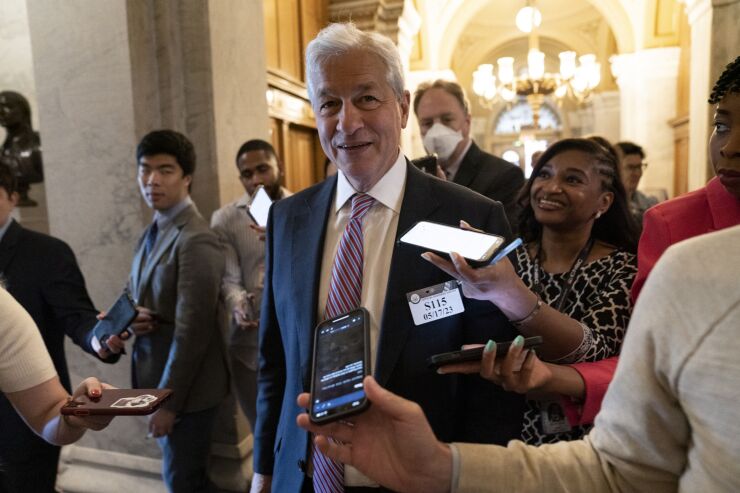
The CEOs of the nation's largest banks, which have quietly been preparing for a doomsday scenario in which the government can't pay all of its bills, discussed the
At the meeting, Yellen told the executives that a failure to raise or suspend the debt limit would be catastrophic for the financial system, according to a
The CEOs' meeting with Yellen followed sit-downs on Wednesday with Deputy Treasury Secretary Wally Adeyemo and Senate Majority Leader Chuck Schumer. Schumer, D-N.Y., told the executives that they should push every member of Congress to commit to not allowing the nation to default, according to a source briefed on the conversation.
With
"I think everybody recognizes that it's an important situation," said Rob Toomey, head of capital markets at the Securities Industry and Financial Markets Association. "You don't want to see failure to pay on Treasury securities."
Earlier in the week, the CEOs of Goldman Sachs and Morgan Stanley were among the signatories of a letter urging President Biden and top lawmakers to act swiftly to prevent a "potentially devastating scenario," which could arise if a deal isn't negotiated soon.
The potential fallout
"I think the main point is that if a deal isn't reached and there's a perceived threat of default or a potential default on government debt, there's going to be a lot of volatility," said David Konrad, an analyst at Keefe, Bruyette & Woods who covers large banks. "There's so much uncertainty."
Internally, big banks have been trying to figure out how to handle a potential default, though officials have been tight-lipped about the details of their planning.
JPMorgan Chase, the nation's largest bank by assets,
A Truist Financial spokesperson said that the Charlotte, North Carolina, company plans for a wide variety of risks and adverse economic scenarios, and that its teams continue to monitor the situation closely.
And Citigroup has said that it constantly runs scenario analyses — and plans for — a range of macroeconomic or geopolitical situations.
At a conference earlier this month, Citi CEO Jane Fraser said that the current debt-ceiling standoff seems more serious than previous ones.
"We stay out of the politics — but we do lay out what are the consequences of this," Fraser said. "This starts very quickly to have serious economic consequences for consumers, for investors and, frankly, the credibility of the U.S. financial system."
The playbooks that banks and other financial institutions are using this month have been developed during previous debt-limit showdowns. Some companies are reviewing SIFMA's playbook, which was most recently revised in December of 2021, Toomey said.
"Every other time this has come up, we've been very careful to dust these off, make sure people know about them and make sure they're right," said SIFMA's Toomey. "A lot of these firms are certainly planning. We're just trying to provide a fair set of assumptions that people can work with to help with their planning."
SIFMA's playbook lays out three potential scenarios.
One way that the government could respond to a breach of the debt limit is by delaying the principal payment on a security, potentially in one-day increments. Another option would be to delay coupon payments. And the third scenario, which industry officials consider highly unlikely, is that the government could miss a payment deadline and fail to extend the security's maturity.
"There are expected changes and volatility and price movements within the market that should be expected, should Treasury fail to pay on a given day," Toomey said. "What that means to the portfolio of securities is up to the banks to plan for."
In the aftermath of previous debt-ceiling sagas, more information has emerged about the details of the banks' planning.
In 2013, as then-President Obama was locked in a standoff with congressional Republicans, JPMorgan explored the possibility of underwriting federal government benefits, according to a Reuters story after the debt ceiling was raised.
Claire Williams contributed to this story.






